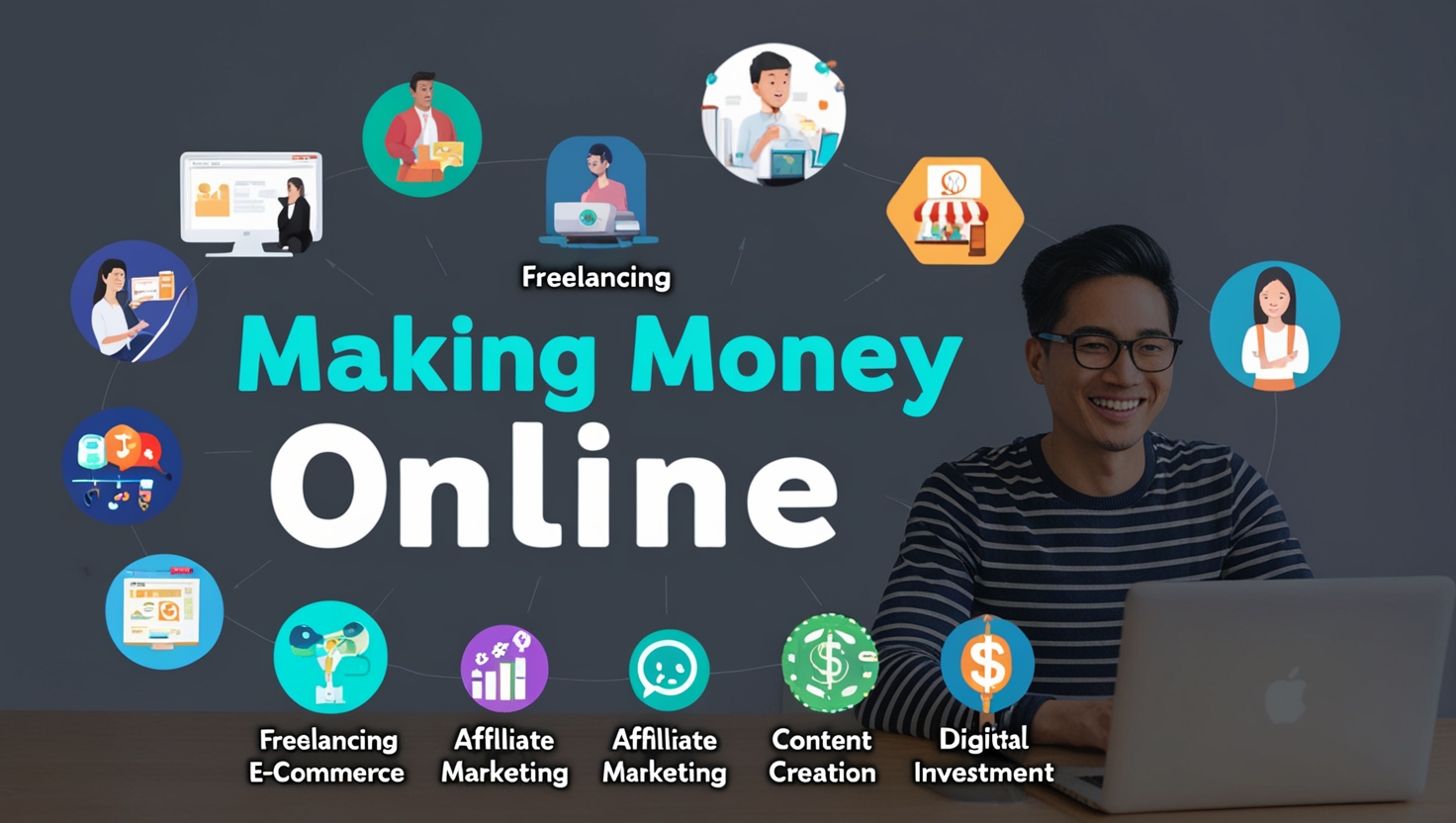مقدمة: البرمجة نافذة على عالم من الفرص المالية
في عالم اليوم الرقمي المتسارع، لم تعد البرمجة مجرد مهارة تقنية، بل أصبحت بوابة واسعة نحو فرص مالية لا حصر لها. مع تزايد اعتماد الشركات والمؤسسات والأفراد على التطبيقات والمواقع الإلكترونية، يرتفع الطلب بشكل مطرد على المبرمجين والمطورين المهرة القادرين على تحويل الأفكار إلى واقع رقمي ملموس. هذا المقال سيكشف لك عن استراتيجيات الربح من البرمجة وتطوير التطبيقات والمواقع، مع التركيز على كيفية استغلال الفرص المتاحة في السوق لتحقيق الاستقلال المالي.
الفصل الأول: تحديد التخصص المناسب لك في عالم البرمجة
عالم البرمجة واسع ومتشعب، ويضم العديد من التخصصات المختلفة. قبل البدء في رحلة الربح من البرمجة، من الضروري تحديد التخصص الذي يناسب مهاراتك واهتماماتك، والذي يتمتع بطلب مرتفع في السوق. تشمل بعض التخصصات الأكثر شيوعًا:
- تطوير الويب (Web Development): يركز على بناء وتطوير المواقع الإلكترونية، سواء كانت مواقع بسيطة أو تطبيقات ويب معقدة. يشمل ذلك تطوير الواجهة الأمامية (Front-end) باستخدام لغات مثل HTML، CSS، و JavaScript، وتطوير الواجهة الخلفية (Back-end) باستخدام لغات مثل Python، PHP، أو Java.
- تطوير تطبيقات الهاتف المحمول (Mobile App Development): يركز على تطوير التطبيقات التي تعمل على الهواتف الذكية والأجهزة اللوحية. يشمل ذلك تطوير تطبيقات iOS (باستخدام Swift أو Objective-C) وتطبيقات Android (باستخدام Java أو Kotlin).
- تطوير الألعاب (Game Development): يركز على تصميم وتطوير الألعاب الإلكترونية. يشمل ذلك استخدام محركات الألعاب مثل Unity أو Unreal Engine، بالإضافة إلى لغات البرمجة مثل C# أو C++.
- علوم البيانات (Data Science): يركز على تحليل البيانات واستخلاص رؤى قيمة منها. يشمل ذلك استخدام لغات البرمجة مثل Python و R، بالإضافة إلى أدوات وتقنيات مثل تعلم الآلة (Machine Learning) والذكاء الاصطناعي (Artificial Intelligence).
- تطوير البرمجيات (Software Development): يشمل تطوير مجموعة واسعة من البرامج والتطبيقات، بما في ذلك برامج سطح المكتب، وبرامج الخادم، وأنظمة التشغيل.
نصيحة عملية: ابحث عن التخصصات التي تتوافق مع مهاراتك وشغفك، وحاول التركيز على التخصصات التي تشهد نموًا سريعًا في السوق.
الفصل الثاني: بناء مهاراتك البرمجية: الأساس الصلب للنجاح المالي
بعد تحديد التخصص المناسب، الخطوة التالية هي بناء مهاراتك البرمجية. هناك العديد من الطرق لتعلم البرمجة، بما في ذلك:
- الدورات التدريبية عبر الإنترنت (Online Courses): تتوفر العديد من الدورات التدريبية عبر الإنترنت التي تغطي مختلف جوانب البرمجة. تشمل بعض المنصات الشهيرة Coursera، Udemy، edX، و Udacity.
- المعسكرات التدريبية (Bootcamps): هي برامج تدريبية مكثفة تهدف إلى تعليمك البرمجة في فترة زمنية قصيرة.
- الجامعات والكليات (Universities and Colleges): تقدم الجامعات والكليات برامج دراسية في علوم الحاسب والهندسة البرمجية.
- المصادر المجانية عبر الإنترنت (Free Online Resources): تتوفر العديد من المصادر المجانية عبر الإنترنت، مثل الوثائق الرسمية للغات البرمجة، والمدونات، والقنوات التعليمية على YouTube.
نصيحة عملية: ركز على تعلم الأساسيات بشكل متين، ثم انتقل إلى تعلم التقنيات والأدوات الأكثر تقدمًا. مارس البرمجة بانتظام من خلال بناء مشاريع صغيرة وتطبيق ما تعلمته.
الفصل الثالث: استراتيجيات الربح من البرمجة: طرق متعددة لتحقيق الدخل
بمجرد أن تمتلك مهارات برمجية قوية، يمكنك البدء في استكشاف استراتيجيات الربح المختلفة. تشمل بعض الاستراتيجيات الأكثر شيوعًا:
- العمل الحر (Freelancing): يمكنك تقديم خدماتك البرمجية للعملاء عبر الإنترنت من خلال منصات العمل الحر مثل Upwork، Freelancer، و Fiverr.
- تطوير التطبيقات والمواقع الخاصة بك (Developing Your Own Apps and Websites): يمكنك تطوير التطبيقات والمواقع الخاصة بك وبيعها أو تحقيق الدخل منها من خلال الإعلانات أو الاشتراكات.
- العمل كموظف في شركة (Working as an Employee): يمكنك العمل كمبرمج أو مطور في شركة تقنية أو أي شركة أخرى تحتاج إلى خدمات برمجية.
- إنشاء دورات تدريبية عبر الإنترنت (Creating Online Courses): يمكنك مشاركة خبرتك البرمجية مع الآخرين من خلال إنشاء دورات تدريبية عبر الإنترنت وبيعها على منصات مثل Udemy أو Teachable.
- المساهمة في مشاريع مفتوحة المصدر (Contributing to Open Source Projects): يمكنك المساهمة في مشاريع مفتوحة المصدر وكسب المال من خلال التبرعات أو الرعاية.
مثال عملي: قام مبرمج عربي بتطوير تطبيق بسيط لحساب السعرات الحرارية ونشره على متجر Google Play. حقق التطبيق نجاحًا كبيرًا وحصل على تقييمات عالية، مما أدى إلى زيادة عدد المستخدمين وبالتالي زيادة الإيرادات من الإعلانات.
الفصل الرابع: العمل الحر: طريقك نحو الاستقلال المالي
العمل الحر هو خيار شائع للعديد من المبرمجين، حيث يوفر لهم المرونة والحرية في اختيار المشاريع التي يعملون عليها وتحديد أسعارهم. لتحقيق النجاح في العمل الحر، يجب عليك:
- بناء ملف تعريف قوي (Building a Strong Profile): قم بإنشاء ملف تعريف احترافي على منصات العمل الحر، واعرض مهاراتك وخبراتك وأعمالك السابقة.
- تقديم عروض أسعار تنافسية (Submitting Competitive Bids): قم بتقديم عروض أسعار تنافسية للمشاريع التي تهتم بها، مع مراعاة خبرتك ومستوى صعوبة المشروع.
- تقديم عمل عالي الجودة (Delivering High-Quality Work): قدم عملًا عالي الجودة وفي الوقت المحدد، للحصول على تقييمات إيجابية من العملاء.
- التواصل الفعال مع العملاء (Communicating Effectively with Clients): تواصل بوضوح وفعالية مع العملاء لفهم احتياجاتهم وتوقعاتهم.
إحصائية: تشير الإحصائيات إلى أن متوسط دخل المبرمجين العاملين لحسابهم الخاص أعلى من متوسط دخل المبرمجين العاملين كموظفين في بعض الدول.
الفصل الخامس: تطوير التطبيقات والمواقع الخاصة بك: بناء إمبراطورية رقمية
تطوير التطبيقات والمواقع الخاصة بك هو طريقة رائعة لتحقيق الدخل السلبي وبناء علامة تجارية شخصية. لتحقيق النجاح في هذا المجال، يجب عليك:
- تحديد فكرة مبتكرة (Identifying an Innovative Idea): ابحث عن فكرة مبتكرة تحل مشكلة حقيقية أو تلبي حاجة معينة لدى المستخدمين.
- تصميم وتطوير التطبيق أو الموقع (Designing and Developing the App or Website): قم بتصميم وتطوير التطبيق أو الموقع بشكل احترافي، مع التركيز على تجربة المستخدم وسهولة الاستخدام.
- تسويق التطبيق أو الموقع (Marketing the App or Website): قم بتسويق التطبيق أو الموقع عبر مختلف القنوات، مثل وسائل التواصل الاجتماعي، والإعلانات عبر الإنترنت، والتسويق بالمحتوى.
- تحقيق الدخل من التطبيق أو الموقع (Monetizing the App or Website): يمكنك تحقيق الدخل من التطبيق أو الموقع من خلال الإعلانات، والاشتراكات، أو بيع المنتجات أو الخدمات.
مثال عملي: قام مبرمج بتطوير تطبيق تعليمي للأطفال ونشره على متجر App Store. حقق التطبيق نجاحًا كبيرًا وأصبح مصدر دخل ثابت للمبرمج.
الفصل السادس: العمل كموظف: الاستقرار المالي والنمو المهني
العمل كموظف في شركة يوفر لك الاستقرار المالي والفرص للنمو المهني. للحصول على وظيفة في مجال البرمجة، يجب عليك:
- بناء سيرة ذاتية قوية (Building a Strong Resume): قم ببناء سيرة ذاتية احترافية تعرض مهاراتك وخبراتك وأعمالك السابقة.
- التحضير للمقابلات (Preparing for Interviews): استعد جيدًا للمقابلات من خلال مراجعة المفاهيم الأساسية في البرمجة وحل المشكلات البرمجية.
- توسيع شبكة علاقاتك المهنية (Expanding Your Professional Network): تواصل مع المبرمجين الآخرين وحضر المؤتمرات والفعاليات التقنية.
- البحث عن الشركات التي تتوافق مع قيمك وأهدافك (Finding Companies That Align with Your Values and Goals): ابحث عن الشركات التي تقدم فرصًا للنمو المهني وتدعم تطوير مهاراتك.
نصيحة عملية: ركز على تطوير مهاراتك باستمرار والبقاء على اطلاع بأحدث التقنيات في مجال البرمجة.
الفصل السابع: إنشاء دورات تدريبية عبر الإنترنت: مشاركة المعرفة وتحقيق الدخل
إذا كنت تمتلك خبرة واسعة في مجال البرمجة، يمكنك مشاركة معرفتك مع الآخرين من خلال إنشاء دورات تدريبية عبر الإنترنت. لتحقيق النجاح في هذا المجال، يجب عليك:
- تحديد موضوع الدورة (Identifying the Course Topic): اختر موضوعًا للدورة يكون مطلوبًا في السوق ويتوافق مع خبرتك.
- إنشاء محتوى الدورة (Creating Course Content): قم بإنشاء محتوى دورة عالي الجودة وشامل، مع التركيز على الجانب العملي والتطبيقي.
- تسويق الدورة (Marketing the Course): قم بتسويق الدورة عبر مختلف القنوات، مثل وسائل التواصل الاجتماعي، والإعلانات عبر الإنترنت، والتسويق بالمحتوى.
- تقديم الدعم للطلاب (Providing Support to Students): قدم الدعم للطلاب والإجابة على أسئلتهم واستفساراتهم.
مثال عملي: قام مبرمج بإنشاء دورة تدريبية عبر الإنترنت حول تطوير تطبيقات Android ونشرها على Udemy. حقق الدورة نجاحًا كبيرًا وأصبحت مصدر دخل ثابت للمبرمج.
الفصل الثامن: المساهمة في مشاريع مفتوحة المصدر: رد الجميل للمجتمع وكسب المال
المساهمة في مشاريع مفتوحة المصدر هي طريقة رائعة لرد الجميل للمجتمع البرمجي وكسب المال في نفس الوقت. لتحقيق النجاح في هذا المجال، يجب عليك:
- اختيار مشروع مفتوح المصدر (Choosing an Open Source Project): اختر مشروعًا مفتوح المصدر يثير اهتمامك ويتوافق مع مهاراتك.
- فهم قواعد المساهمة (Understanding the Contribution Guidelines): اقرأ قواعد المساهمة الخاصة بالمشروع وتأكد من فهمها.
- المساهمة في المشروع (Contributing to the Project): قم بالمساهمة في المشروع من خلال إصلاح الأخطاء، وإضافة ميزات جديدة، وكتابة الوثائق.
- التواصل مع المجتمع (Communicating with the Community): تواصل مع أعضاء المجتمع الآخرين وشارك في المناقشات.
نصيحة عملية: ابدأ بمشاريع صغيرة ثم انتقل إلى مشاريع أكبر وأكثر تعقيدًا.
الفصل التاسع: نصائح إضافية لتحقيق النجاح المالي في مجال البرمجة
- التعلم المستمر (Continuous Learning): استمر في تعلم التقنيات والأدوات الجديدة في مجال البرمجة.
- بناء شبكة علاقات قوية (Building a Strong Network): تواصل مع المبرمجين الآخرين وحضر المؤتمرات والفعاليات التقنية.
- التركيز على الجودة (Focusing on Quality): قدم عملًا عالي الجودة وفي الوقت المحدد.
- إدارة الوقت بكفاءة (Managing Time Efficiently): تعلم كيفية إدارة وقتك بكفاءة لتلبية المواعيد النهائية.
- التسويق لنفسك (Marketing Yourself): سوق لنفسك ومهاراتك عبر الإنترنت.
الفصل العاشر: الخلاصة: البرمجة مفتاحك نحو مستقبل مالي مزدهر
البرمجة هي مهارة قيمة يمكن أن تفتح لك الأبواب أمام فرص مالية لا حصر لها. من خلال بناء مهاراتك البرمجية، واستكشاف استراتيجيات الربح المختلفة، والعمل الجاد والمثابرة، يمكنك تحقيق الاستقلال المالي وبناء مستقبل مزدهر.
إخلاء المسؤولية: هذا المقال يقدم معلومات عامة حول الربح من البرمجة وتطوير التطبيقات والمواقع. لا ينبغي اعتباره نصيحة مالية أو استثمارية. يجب عليك استشارة مستشار مالي متخصص قبل اتخاذ أي قرارات مالية.




